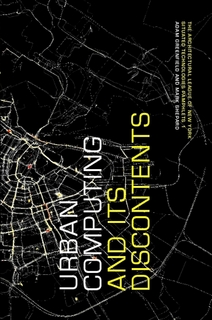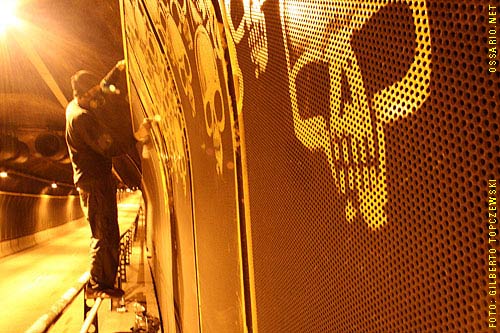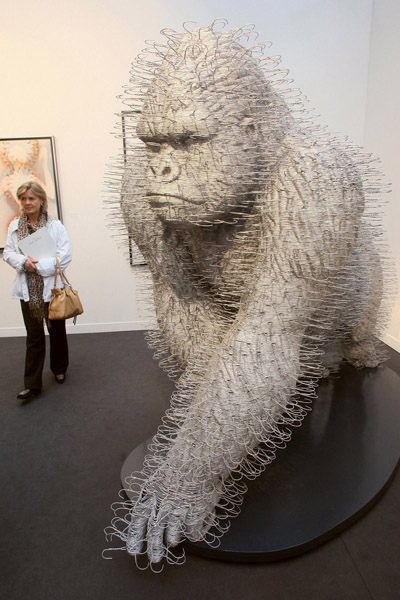Sayonara, salaryman
Posted to The Economist.
The conclusion:
Nobu, the young salaryman, likes his job but plans to start his own business one day. The older men in his office struck compromises that he is not prepared to endure. “After 1945, we were left with nothing, so we had to work together, with the same goal and as one team. We were a success, and Japan grew,” he says. “But this organisation doesn’t work any more. It has stayed the same for too long. The system has rusted.”
Urban Computing and its Discontents
Since the late 1980s, computer scientists and engineers have been researching ways of embedding computational intelligence into the built environment. Looking beyond the model of personal computing, which placed the computer in the foreground of our attention, “ubiquitous” computing takes into account the social dimension of human environments and allows computers themselves to vanish into the background. No longer solely virtual, human interaction with and through computers becomes socially integrated and spatially contingent, as everyday objects and spaces are linked through networked computing.
Conversation between Adam Greenfield and Mark Shepard.
Go read, this is important.
Via Bruce Sterling at Beyond the Beyond.
Granta
Simon Garfield in The Observer
I dropped into Quinto, the second-hand bookshop on Charing Cross Road. Granta was about to celebrate its 100th edition, and I wanted some early copies - those classic ones with writing by Richard Ford, John Berger, Martin Amis and Angela Carter. The man at the counter wasn't impressed. 'What's Granta?'
I could have given him the usual: about how it was a river in Cambridge, or the upper part of one, and its name spawned a student magazine that began in 1889 and was revived in the late 1970s. I could have said that this magazine became home to some of the best writing in the English language, and was edited for half its life by a man, Bill Buford, described to me as 'a crazy, inspiring, absolutely absurd lunatic'. But instead I said: 'It's a literary magazine, but it looks like a book.'
Via Arts & Letters Daily.
Where Are Islam's Silent Moderates?
Ayaan Hirsi Ali in the NYT:
It is often said that Islam has been "hijacked" by a small extremist group of radical fundamentalists. The vast majority of Muslims are said to be moderates.
But where are the moderates? Where are the Muslim voices raised over the terrible injustice of incidents like these? How many Muslims are willing to stand up and say, in the case of the girl from Qatif, that this manner of justice is appalling, brutal and bigoted - and that no matter who said it was the right thing to do, and how long ago it was said, this should no longer be done?
Usually, Muslim groups like the Organization of the Islamic Conference are quick to defend any affront to the image of Islam. The organization, which represents 57 Muslim states, sent four ambassadors to the leader of my political party in the Netherlands asking him to expel me from Parliament after I gave a newspaper interview in 2003 noting that by Western standards some of the Prophet Muhammad's behavior would be unconscionable. A few years later, Muslim ambassadors to Denmark protested the cartoons of Muhammad and demanded that their perpetrators be prosecuted.
But while the incidents in Saudi Arabia, Sudan and India have done more to damage the image of Islamic justice than a dozen cartoons depicting the Prophet Muhammad, the organizations that lined up to protest the hideous Danish offense to Islam are quiet now. . . .
When a "moderate" Muslim's sense of compassion and conscience collides with matters prescribed by Allah, he should choose compassion. Unless that happens much more widely, a moderate Islam will remain wishful thinking.
Via Jonathan Adler at Volokh.
The best "Don't leave me" line yet:
Forget "Think of the Children!", try "Think of the Environment!"
Divorce is not just a family matter. It exacts a serious toll on the environment by boosting the energy and water consumption of those who used to live together, according to a study by two Michigan State University researchers.
The analysis found that cohabiting couples and families around the globe use resources more efficiently than households that have split up. The researchers calculated that in 2005, divorced American households used between 42 and 61 percent more resources per person than before they separated, spending 46 percent more per person on electricity and 56 percent more on water.
But be careful, as your partner may just reply "I've found someone new":
"There's strong evidence, which emerges clearly in this paper, that merging what otherwise would be separate households will reduce energy and other resource needs," Cavanagh wrote in an e-mail. "The best advice to those who are miserable together is not, however, to avoid divorce for the sake of the environment, but to find someone else as quickly as possible."
Via Jonathan Adler at Volokh.
Rebuilding Beijing: pure geometry versus the awkward squad.
Decent quick look at new construction in Beijing.
Via cityofsound.
The Ken Kutaragi Crazy Game Exec Quote Award
Posted by Game|Life to Wired News.
With PlayStation dad Ken Kutaragi taking home the Lifetime Achievement Award at DICE this year, there’s one achievement of his that isn’t in the list of honors: His ability to come up with amazingly insane sound bites. Just a few:
(On PS3’s price) “It’s probably too cheap.”
(On PS3’s price) “We want consumers to think to themselves ‘I will work more hours to buy one.’”
(On PS2’s tech) “Same interface. Same concept. Starting from next year, you can jack into The Matrix!”
Calculating the carbon footprint of wine
There’s a “green line” that runs down the middle of Ohio. For points to the West of that line, it is more carbon efficient to consume wine trucked from California. To the East of that line, it’s more efficient to consume the same sized bottle of wine from Bordeaux, which has had benefited from the efficiencies of container shipping, followed by a shorter truck trip.
Via cityofsound.
Local Cities, Global Problems: Jane Jacobs in an Age of Global Change
Andrew Blum:
“I think we’re not too far off from recognizing that it’s a moral imperative to add density to any place with a transit stop,” believes Christopher Leinberger, a fellow at the Brookings Institution—displaying plenty of the modernist brio and contempt for the souls of cities that Jacobs fought. But I’m tending to agree. We are wedging ourselves between a rock and a hard place: between the pleasures of medium-density living (Greenwich Village, Park Slope, Toronto’s Annex) and the ecological necessity of even more density. When it comes to our homes, we are all justifiably afraid of change, especially when it feels like (or is) destruction. But we don’t often pair that truth with another oft-repeated one: Our way of life is unsustainable. In North America’s most beautiful urban places, we unfailingly fight every new tall building in the name of “quality of life” and the “character of the neighborhood.” We claim to have internalized the idea that it’s all connected, that slowing the warming of the planet is a global project, but the nature in our backyards remains sacred—often to the point, perhaps, of self-destruction.
The key question is how to keep the neighborhood even in high density living. Take a look at cities that have naturally grown with high density, like Hong Kong, and you will see it is possible.
Via cityofsound.
Beeb is in trouble
The BBC is in trouble, political and economic. So what do they do? Make huge cuts in personnel and spending. Problem is that nearly everyone agrees that the reason they are in trouble is the quality of their programs are not where they should be, and of course the cuts are going to doom them. Some are standing up and shouting, is anyone listening?
We have had a series of cuts which will make it impossible to do what we have done up to now if they continue in the way they are continuing... And we are told there is going to be another massive cut over the next five years. The problem is, the BBC is in a whole range of things, it has many television channels, many radio stations, an internet presence and the rest of it. Maybe we are at a time when strategic judgments need to be made. If money has to be spent on the whole digital switchover for example, and building office blocks in Salford and all the rest of it, then maybe instead of cutting everything salami-sliced, then maybe we need to make judgments about the sort of things that we do, and maybe that does involve saying, reluctantly, and I hate to say this because it has been a wonderful institution, maybe we need to say perhaps we should be doing less better.
Via cityofsound.
constraint city
A chest strap (corset) with high torque servo motors and a WIFI-enabled game-console are worn as fetish object. The higher the wireless signal strength of close encrypted networks, the tighter the corset becomes. Closed network points improve the pleasurable play of tight lacing the performer‘s bustier. Thus, constituting the aether as a space of possible pregnancy, filled with potential access-points to the networks of communication. Everyday walks between home, work and leisure are recompiled into a schizogeographic pain-map which is fetched from GoogleMaps servers with automated scripts. By wearing the straight-jacket, the artist not only writes, but is at once also able to read the city code.
Via MAKE: Blog.
VectorMagic
Posted by John Gruber to Daring Fireball.
Free online web app, converts bitmap images into vector art, and does a surprisingly good job of it. (Via Gus Mueller.)
Conservative Authors Sue Publisher
Authors sign bad contract for 10% of net rather than usual 15% of gross, get screwed by publisher selling at cost, and then pull out this wonder:
“It suddenly occurred to us that Regnery is making collectively jillions of dollars off of us and paying us a pittance.” He added: “Why is Regnery acting like a Marxist cartoon of a capitalist company?”
And might this have something to do with it?
“These guys created the conservative book market,” Mr. Mowbray said. “Before them, conservatives were having to fight, generally unsuccessfully, to get books published.”
Via Gruber.
Publish or Perish
The publishing outfit that produced LaRouche propaganda finally collapsed, and the whole organization probably will follow. Avi Klein has an interesting look back at the remarkably little impact LaRouche has had on american politics, despite the millions spent.
Via Arts & Letters Daily.
Ze Frank: Strike Day
Ok I hate Ze Frank, but he hits the mood of public perception about this strike about spot on.
Via Gruber at Daring Fireball.
Alexandre Orion: Ossario
Flash website :argh: so I won’t quote from it, but the gist is:
The skulls belong all to us. I wanted to bring a catacomb from the near future to the present, to show people that the tragedy of pollution is happening right now. I try to remind people of things they are trying to forget.
Via MAKE: Blog.
German Border Threat: Cheap Books
Posted by MICHAEL KIMMELMAN to NYT > Arts.
I called Rafael Corazza, director of the Competition Commission, to ask what he was thinking. “It’s not normal for one market to have special regulations,” he explained. “It was a cartel. The German and Swiss booksellers said it was for a good purpose — they made a cultural argument, but we are an economic commission. They said the system fosters a broader, deeper market for books, that discounting will hurt the small booksellers who support the small publishers, and then you will have fewer books and more focus on best sellers.”
Are they right? I asked.
“I’m not quite sure they’re completely wrong,” he said. “Nobody knows for sure yet. But nobody can read one million titles, so the question is, is it better that more people read fewer books or that fewer people read a lot of different books?”








